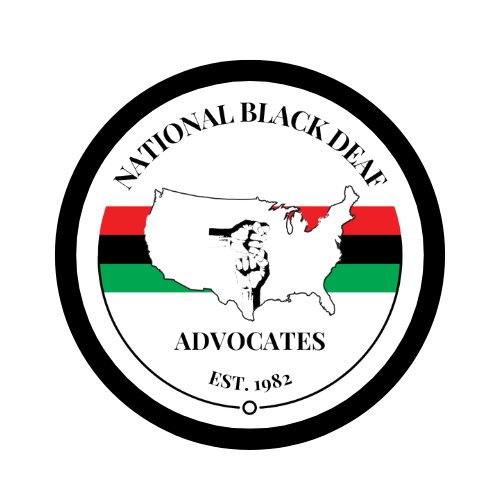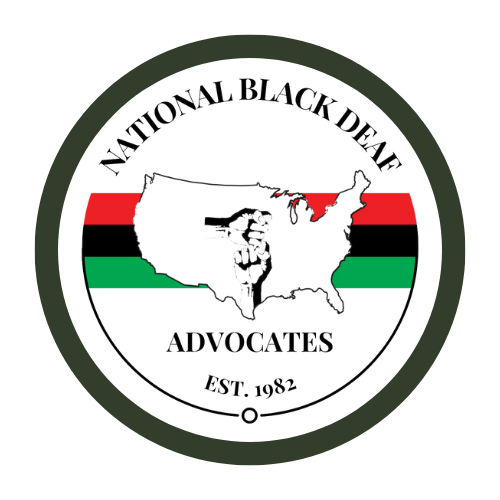National Black Deaf Advocates, Inc. makes the following public statement on the alleged violations of the Americans with Disabilities Act by the University of Maryland Prince George’s Hospital Center for failing to provide equal access to a Deaf individual.
For four days following the patient’s admission to Prince George’s Hospital Center on December 17, 2017, the patient’s spouse, who is Deaf, was denied equal access to communication on the decisions that impacted the health and welfare of the patient’s life. After initially providing communication access with a live sign language interpreter onsite for only two hours, the hospital switched to the use of a Video Remote Interpreter (VRI) service. The VRI accommodation was an ineffective alternative.
In response to the unsatisfactory use of VRI services, the Deaf family member along with another relative of the patient discussed a verbal complaint with Fox 5 Washington D.C. reporter accusing the hospital of ceasing to provide a live interpreter and instead providing a Video Remote Interpreter (VRI). As a result, the technical issues with the hospital’s VRI service failed to allow the Deaf family member equal communication access in the decision-making and communication regarding the life threatening issues pertinent to the patient’s health care and treatment.
The alleged violations of the ADA are serious and put lives at risk, whether the individuals are patients, family members, companions, or other individuals entitled to an equal opportunity to participate in and benefit from the services, programs, and activities of the hospital.
Not only did Prince George’s Hospital Center fail to provide a live sign language interpreter for four days, they also failed to give primary consideration to the Deaf family member’s communication needs.
The guidance provided in this position statement by the National Association of the Deaf (NAD) focuses on the use of VRI services in hospitals, including its use in the emergency department, in-patient hospital settings, and clinics. https://www.nad.org/about-us/position-statements/position-statement-on-vri-services-in-hospitals/.
Two of the most important points excerpted from the NAD position statement on VRI services in the hospitals that NBDA wishes to reiterate to all hospitals:
1) The U.S. Department of Health and Human Services, Office of Civil Rights has consistently required hospitals to provide qualified interpreters to deaf clients, and has stated that “it would be extremely difficult for the health care provider to demonstrate in certain service settings, that effective communication is being provided in the absence of . . . interpreters.” (Section 504, Effective Communications, and Health Care Providers, U.S. Department of Health and Human Services, Region III, Regional Technical Assistance Staff (January, 1982), page 5.)
2) A deaf individual knows best which auxiliary aid or service will achieve effective communication with his or her health care provider. Hospitals must consult with a deaf individual and consider carefully his or her self-assessed communication needs before acquiring a particular auxiliary aid or service. The health care provider can choose which auxiliary aid or service to provide, as long as it results in effective communication with the deaf individual. If a deaf individual uses sign language, hospitals should provide a qualified sign language interpreter on-site or, when that is not possible, procure VRI services.
NBDA’s position on the use of VRI services in the hospitals is aligned with the position of the NAD that the use of on-site interpreters should always be paramount, and when VRI is used in the absence of any available on-site interpreter, it must be used properly in terms of policy, procedure, and technology. Failure to conform to these standards is not only a failure to ensure effective communication under federal law but also creates unnecessary risks to the medical welfare and health care of Deaf individuals.
The Deaf community relies upon all hospitals to provide full access to communication with Deaf patients, family members, companions or other individuals. Specifically, all hospitals must give primary consideration to the requests of Deaf individuals when determining what method of effective communication is necessary before acquiring a particular aid or service.
NBDA strongly urges Prince George’s Hospital Center to immediately provide equal and accessible accommodations as well as review its policies and procedures to ensure it fully benefits Deaf individuals with an equal opportunity to participate in and benefit from the hospital’s services and activities.
Respectfully Submitted,
Evon Black
NBDA President
###
Founded in 1982, National Black Deaf Advocates is the nation’s only advocacy organization catered to thousands of Black Deaf and hard of hearing people in the United States. Its members throughout the United States and the world make up the premier advocates for civil rights of Black Deaf Americans in their communities, using shared resources to support the improvement of services for the Deaf, and advocating for the consistency of justice among all peoples.
cc: Neil J. Moore, President/CEO
Capital Region Health
UM Prince George’s Hospital Center
3001 Hospital Drive
Cheverly, MD 20785
Dr. Sherrill Sorenson, VP & Chief Nursing Officer
Capital Region Health
UM Prince George’s Hospital Center
3001 Hospital Drive
Cheverly, MD 20785
Howard Rosenblum, CEO
Melissa S. Draganac Hawk, President
National Association of the Deaf
8630 Fenton Street, Suite 820
Silver Spring, MD 20910
Cori Coffin, Reporter
Fox 5 Washington, D.C.
151 Wisconsin Ave. NW
Washington, DC 20016
Cori Coffin, Reporter
Fox 5 Washington, D.C.
151 Wisconsin Ave. NW
Washington, DC 20016
Kelby Brick, Esq., Director
Maryland Governor’s
Office of the Deaf and Hard of Hearing
100 Community Place
Crownsville, MD 21032
Leyland Lyken, President
District of Columbia Area
Black Deaf Advocates
P.O. Box 90508
Washington, D.C. 20090
Meredith DeSomma, President
Maryland Association of Deaf
P.O. Box 527
Burtonsville, MD 20866
Billy Sanders, President
National Alliance of Black interpreter, Inc.-DC
P.O. Box 90532
Washington, DC 20090
Local News References:
Fox 5 Washington, D.C. News (www.fox5dc.com/news/local-news)
• News Text & Video: http://www.fox5dc.com/news/local-news/family-accuses-prince-georges-hospital-center-of-violating-americans-with-disabilities-act-law
Legal & News References:
• Consent Decree – Plaintiffs and United States of America vs Inova Health System https://www.ada.gov/inova.htm
• Access to Hospital Secured in Settlement with Inova Health System https://www.nad.org/2011/03/30/access-to-hospital-secured-in-settlement-with-inova-health-system/
• Local hospitals accused of discrimination, making patients feel ‘completely powerless’ http://wjla.com/news/local/disability-discrimination-local-hospitals-accused-of-making-patients-feel-completely-powerless–1112
Contact Information:
NBDA will continue to monitor the complaint and work with other organizations and former and current Deaf patients or individuals in their experience with the Prince George’s Hospital Center and advocate where necessary. For further contact or inquiry, please contact us at [email protected] or via our website at https://www.nbda.org/contact.


Comments are closed